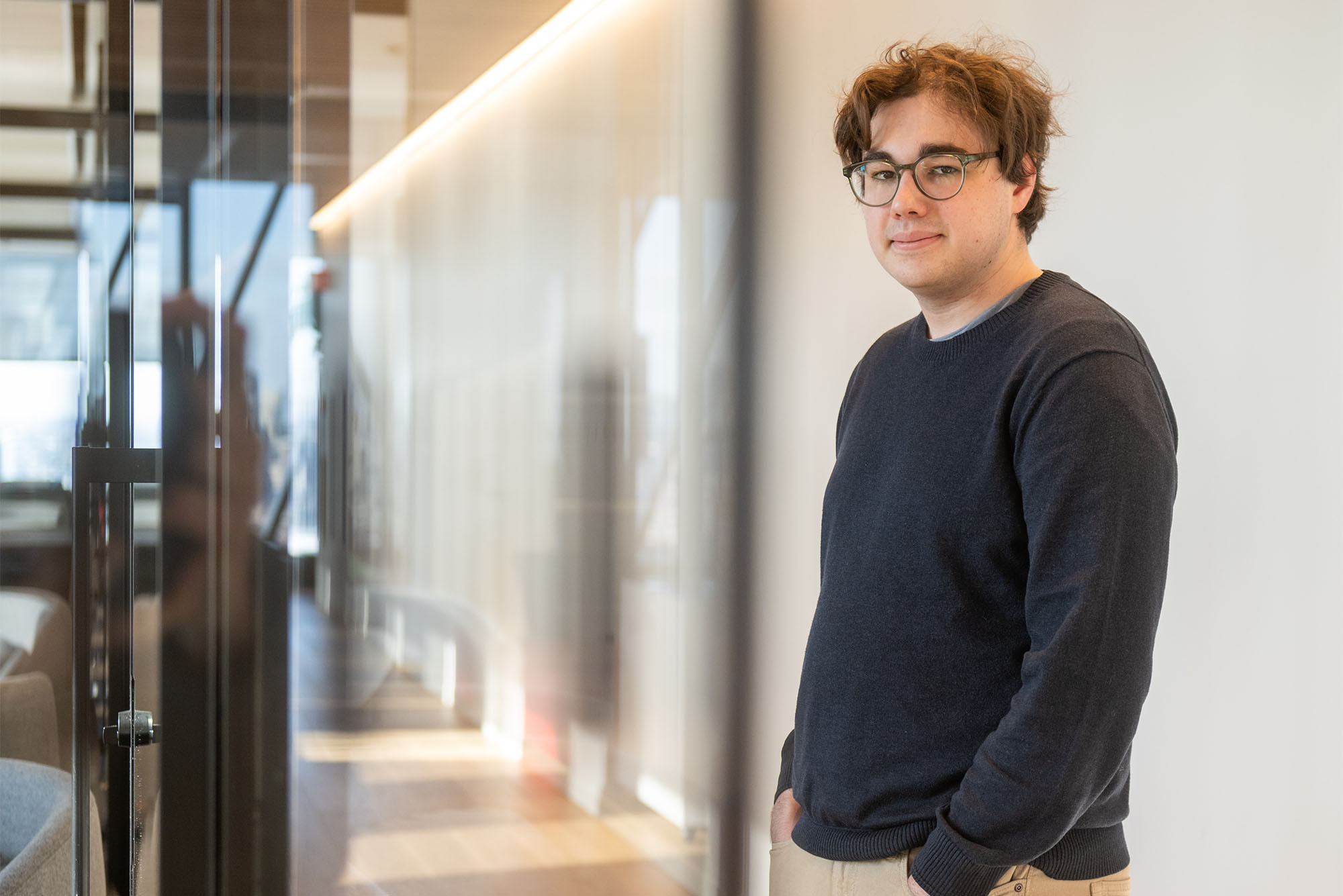Undergraduate Research Study Project Explores Do-It-Yourself Extremism
Pardee students probe hard-to-track online radicalization, say thwarting violence requires reorienting the common view of terrorists to deal with the social and mental challenges in their lives

Combating terrorism requires rebooting our moralistic take on terrorists as pure evil, says Jack Martin (Pardee’25), who did undergraduate research on the topic.
Undergraduate Research Study Project Explores Do-It-Yourself Extremism
Pardee students probe hard-to-track online radicalization, say thwarting violence requires reorienting the common view of terrorists to deal with the social and mental challenges in their lives
Payton Gendron, who as a teen murdered 10 African American grocery shoppers in Buffalo two years ago, typifies domestic terrorism. White supremacy is the biggest terror threat domestically, law enforcement says. Gendron reflects another disturbing trend: he didn’t need the middleman of a terrorist group to set him on his rampage. He imbibed racist ideology trawling online platforms.
Such terrorists “often receive labels of ‘crazy’ or ‘barbarian,’ language that reduces their motivations to an irrational bloodlust,” writes Jack Martin (Pardee’25). In a funding proposal for his ongoing Undergraduate Research Opportunities Program (UROP) project, Martin says this approach “risks dangerously oversimplifying” the more personal drivers of extremism, among them social isolation,
The first stage of his UROP research, done with Jasmin Tagijeva (Pardee’25), probes the nexus of these problems and DIY radicalization online.
Their study for UROP, which sponsors faculty-mentored undergraduate inquiry, was overseen by Jessica Stern, a research professor at the Pardee School of Global Studies. Their work is part of a broader study—by Stern and Harvard colleagues into the roots of radicalization—that recently received a Guggenheim Distinguished Scholar grant. The research is vital, Stern says, because “the FBI reports that lone actors are much harder to identify and stop before they carry out acts of violence.

“It is illegal to join ISIS, raise money for ISIS, recruit for ISIS, etc., because ISIS is a listed ‘foreign terrorist organization,’” Stern notes, adding that “there is no analogous list of domestic terrorist organizations, and the First Amendment protects individuals who spread the ideology of such organizations.” While it’s illegal for domestic groups to commit terrorism, she says, “it is not illegal to join, raise money for, spread propaganda, or recruit for a domestic terrorist group such as a neo-Nazi organization.”
Thwarting violence requires reorienting the common view of terrorists to deal with the social and emotional challenges in their lives, Martin argues.
“Most of the time, it’s not just this person spontaneously decided to become an extremist,” he says. “There’s stuff that leads up to that—trauma or bullying.…Terrorists are committing horrific acts, and there’s no justification for that.” But the cases he and Tagijeva analyzed for their UROP project were radicalized but not violent. They subscribed to extremist ideologies as a way to treat their pain and find a virtual community.
“There’s always something that is separating them from the rest of society that makes them think that that society is prejudiced against them,” Martin says. “Those ideologies that so concretely construct an ‘other’ that’s out to get you, that’s out to control the world—that’s extremely persuasive to someone who already kind of feels like that in their personal life.”
For their project, Martin and Tagijeva pored through hundreds of anonymized interview transcripts with 52 individuals in a database of a nonprofit organization that works to wean people off of budding radicalism. Most of the individuals were Americans; perhaps 80 percent involved US-grown white nationalism, Martin estimates. Most of the rest were involved in Islamic extremism.
“A lot of the cases are of teenagers or people in their early 20s,” he says. “They’re not necessarily full members of extremist organizations.” Many “have contact with members of extremist organizations, but a lot of them are kind of in the earlier stages of radicalization.…A lot of the organization [of violent extremism] comes in the form of online communities, on forums, on message boards like 4chan.
“Most people aren’t joining [in-person terror] groups. They feel lonely or are separated from a sense of community in their personal life, and are looking for something to latch onto.”
Picking a terrorist or extremist group isn’t like choosing a college. “No one starts out by looking for the Oath Keepers or al Qaeda,” Martin says. “Most of the time, it’s a slow radicalization process.”
No one starts out by looking for the Oath Keepers or al Qaeda. Most of the time, it’s a slow radicalization process.
Crucially, he says, the individuals in the database hadn’t yet committed any attacks. The vast research into terrorism after the fact “can really bias the group of people you’re looking at in order to make generalizations about who becomes an extremist.”
What’s to be done? Social media companies could better police their users’ posting, Martin says. But his personal opinion—admittedly the “squishiest, most social science answer that might not be most practically implemented”—is a social reset on how we see terrorists.
“These aren’t animals. They’re not intrinsically violent,” he says. “They’re people who had understandable, realistic struggles in their life, and turned to extremist groups for community that the rest of us find in other, healthier outlets.…It’s difficult to have empathy for people who believe abhorrent things. [But] you have to have a certain sense of analytic empathy that doesn’t treat them with contempt.” The hatreds unleashed by the Gaza war, he says, demonstrate the limits of not understanding extremists’ grievances.
Martin knows their UROP project findings might be fodder for Second Amendment fundamentalists, who argue that mental illness and not a lack of sensible gun safety laws underlies America’s shooting violence. To which he replies, “It’s an awful rhetorical strategy. You can obviously do both things at once.”
Comments & Discussion
Boston University moderates comments to facilitate an informed, substantive, civil conversation. Abusive, profane, self-promotional, misleading, incoherent or off-topic comments will be rejected. Moderators are staffed during regular business hours (EST) and can only accept comments written in English. Statistics or facts must include a citation or a link to the citation.